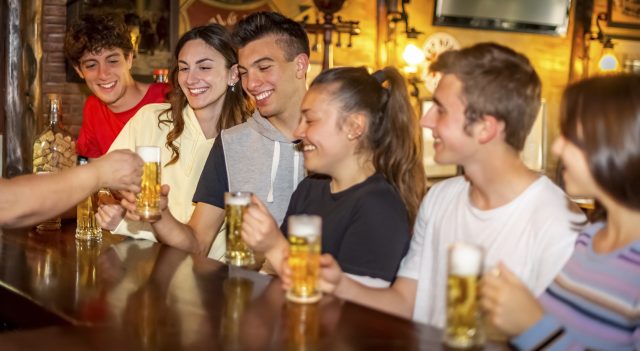This website uses cookies so that we can provide you with the best user experience possible. Cookie information is stored in your browser and performs functions such as recognising you when you return to our website and helping our team to understand which sections of the website you find most interesting and useful.
Scientists challenge idea of beer goggles
Scientists have discovered while alcohol does impair the ability to detect facial symmetry, it does not influence judgements on whether a person is more attractive or not.

The study, which has been published in the Journal of Psychopharmacology, included drinkers in a pub being asked questions about faces on a screen.
It was undertaken to test the so-called beer goggles concept, which claims drinkers can be attracted to other individuals whom they may not desire when sober and having not consumed alcohol.
A theory behind how the beer goggles idea works is based on the value of attractiveness from facial symmetry — believed to be one of the indicators of perceptions of beauty — and that alcohol impairs the ability to detect asymmetry, therefore reducing the threshold for attraction.
The scientists from the University of Plymouth therefore tested the hypotheses that higher breath alcohol drinkers would award more generous ratings of attractiveness to asymmetrical faces, and be poorer at discriminating bilateral facial asymmetry than less intoxicated counterparts.
Some ninety-nine male and female drinkers were quizzed on 18 different faces for both attractiveness and symmetry, with each type of rating given twice, once per face with an enhanced asymmetry, and again for each face in its natural form.
Judgement
Participants in the pub-based study when they asked to judge which of the two versions was more attractive and which were more symmetrical.
It discovered that alcohol had no influence on attractiveness judgements but higher blood alcohol concentrations were associated with higher symmetry ratings.
Furthermore, as predicted, heavily intoxicated individuals were less able to distinguish natural from perfectly symmetrised face versions than more sober drinkers.
As a result, the findings suggested alcohol impaired face asymmetry detection, but it seems that this perceptual distortion does not contribute to the ‘beer goggles’ phenomenon.
A spokesperson said: “The term ‘beer goggles’ has been used for decades to describe when a person finds themselves sexually attracted to someone while intoxicated, but not sober.
“One possible explanation for the effect is that alcohol impairs the drinker’s ability to detect facial asymmetry, thus making potential partners more visually appealing.”
Dutch courage
The new research follows previous studies last year which suggested that alcohol may give you the courage to approach someone at the bar rather than beer goggles.
The findings, published in the Journal of Studies on Alcohol and Drugs, involved 18 pairs of male friends in their 20s, and suggested alcohol would make you more likely to approach someone they already found attractive – but it does not alter the appearance of other people.
According to the researchers, there was no evidence of ‘beer goggles’ but it could impact how those they interact with those they do find attractive. During drinking, they were 1.71 times more likely to select one of their top-four candidates for attractiveness to potentially meet than when sober – suggesting confidence is enhanced by alcohol.

